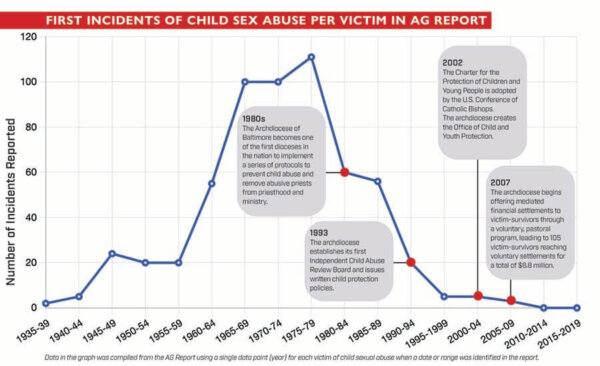The release of the Maryland Attorney General’s report April 5 on clergy sexual abuse in the Archdiocese of Baltimore was a day of sorrow, Archbishop William E. Lori said.
“It’s a day that I must face, and the archdiocese must face the enormity of this horrid legacy of sexual abuse. It is a day when my heart goes out to the victim-survivors, recognizing how many people have been harmed, and harmed very significantly,” he said.
He said that as he read the report, “just as a pastor of souls and as a Catholic, I felt deep sadness. I felt shame. I felt sickened by the report, and I had to ask myself how could this have happened in the life of the church and how could it have gone on so long?”
He admitted he does not know the answer to those questions, although the topic has been studied and factors have been suggested to explain it.
“What I do know is that I am grateful that, however haltingly or imperfectly, the church came to the realization decades ago that it could not go on, and that it had to change how sexual abuse allegations are addressed and how it is that we reach out and accompany victims,” the archbishop said. (See pages 8-10 for victim-survivors’ perspectives.)
“Through the voices of victims, the church began to change decades ago. And here we must give the victims a lot of credit. Not all at once, but in a very steady way, (the church) took really important steps to root sexual abuse out of our ranks,” he said.
Among those steps are zero tolerance and removal from ministry of anyone credibly accused of abuse; creating safe environments within parishes and schools to keep young people safe; reporting to authorities, including the attorney general, “any and every allegation, no matter how long ago it may have happened”; and offering counseling to victims and settlements where that was desired, no matter when the abuse happened.
In a pastoral letter responding to the report, “Apology, Healing and Action: The Church’s Work to Repair the Sacred Trust of the Faithful,” issued in English and Spanish, Archbishop Lori said there were three reasons for writing it: to express again the sorrow of the church for its failures, to see the failures and the suffering they produced through “the lens of Jesus’ redeeming love,” and to communicate how the church has taken steps over the last several decades to accompany victim-survivors and root out the evil of child sexual abuse.
He acknowledged the heinous acts of sexual abuse and the untold harm they inflicted. He added that the behavior of the abusers represents the polar opposite of what any representative of the church should be.
Scope and scale
Speaking with journalists moments before his office released the long-anticipated report on child sexual abuse in the Archdiocese of Baltimore April 5, Maryland Attorney General Anthony Brown said that while stories of abuse have been documented in the past, his office hoped to “make public for the first time the enormous scope and scale of the abuse and concealment perpetrated by the Archdiocese of Baltimore.”
“While it may be too late for the survivors to see criminal justice served, we hope that exposing the archdiocese’s transgressions to the fullest extent possible will bring some measure of accountability and perhaps encourage others to come forward,” he said.
Brown said more than 300 people contacted the attorney general’s office since its investigation began five years ago, with the office interviewing hundreds of survivors and witnesses.
The Archdiocese of Baltimore cooperated with the investigation, turning over hundreds of thousands of pages of documents going back to the 1940s.
Archbishop Lori said he spoke to some victim-survivors in the morning before the anticipated release, an opportunity for which he was grateful, as he has been for the many conversations he has had with victim-survivors over the years.
“I think that first and foremost is listening, believing, walking with (them) – those are the initial steps – but also helping, not only with counseling and settlements, but other ways that they might seek help,” he said. “A second way is to continually demonstrate an ever-renewed commitment to create a church that is safe.
“This church of today is not the church of yesterday. But … never would I ever say we’re done with this. We’re not done because as we learn better and better how to spot the signs of sex abuse, as we learn better and better how to help people who have been abused, those best practices and others have to be incorporated into what we say and what we do.”
Brown, who inherited the investigation from his predecessor, Brian Frosh, appeared April 6 on WYPR radio’s “On the Record” with Sheilah Kast, who asked Brown if the archbishop’s contention that the church has changed is accurate.
“I won’t take issue with Archbishop Lori’s categorization of the archdiocese today,” Brown told WYPR. “What I’ll tell you is that we have reviewed hundreds of thousands of documents, and it is accurate to say that the abuse that we discovered and uncovered pre-dates the current leadership in the archdiocese and they are offenses that occurred in the ’40s, ’50s, ’60s and through the ’80s, some maybe as recently as the ’90s.”
Frosh also noted in a late November interview with WYPR’s Kast that he believed the archdiocesan cover-up is over by saying, “To the best of my knowledge, it is.”
Listening is first
Jerri Burkhardt, director of the archdiocesan Office of Child and Youth Protection, said that when someone comes to the archdiocese with an allegation of abuse, “the first thing we do is listen,” asking clarifying questions if necessary. “We offer pastoral support when a person first discloses that he or she is a victim of church personnel of the Archdiocese of Baltimore. Pastoral support includes an offer to pay for counseling with a therapist of the person’s choice and offer to meet with the archbishop or one of his representatives. That offer is open-ended.”
The next step is to report to law enforcement – including police, the appropriate state’s attorney and the attorney general – and Child Protective Services. The archdiocese cooperates with law enforcement, being careful not to interfere with their investigation. Once law enforcement gives the go-ahead, the archdiocese does its own investigation to determine the suitability for ministry of the accused person – lay or clergy.
All of these steps are reviewed with the archdiocese’s Independent Review Board, a mostly-lay group that advises the archdiocese and the archbishop on child protection policies and practices.
Archbishop Lori noted that his predecessors and he have apologized for the abuse that people suffered at the hands of some people affiliated with the church. He renewed the apology in his pastoral letter. He said he would continue to apologize as long as there are victim-survivors and invite them, as he has in the past, to have a conversation with him, if they so choose.
Seeking forgiveness must spur us to action, the archbishop said.
“I want to eliminate sexual abuse from the life of the church as much as any parent in the archdiocese does, and so do my brother priests, and so do my coworkers,” he said.
“We are striving to earn the trust of people across the archdiocese and of the public authorities every single day. This is not something we deal with episodically. This is something we deal with day by day by day. It is always top of mind with us and has been for a very, very long time,” the archbishop said.
He emphasized that there is no one currently in ministry in the archdiocese who has been credibly accused of abuse.
OCYP’s Burkhardt said it is difficult to use the word closure when speaking about child sexual abuse. “I think healing is a process. My hope is that the attorney general’s report provides healing for victim-survivors and their families and the church.
“Long after this isn’t in the news, my hope is that the church will always be here to help support victim-survivors and their families,” she said.
Archbishop Lori said, “I would hope and pray that (victim-survivors) might find some measure of peace, … a lasting peace of mind and heart. This should not be the last word about who they are; they are God’s sons and daughters and beloved in his sight.” CR
George Matysek Jr. contributed to this story.


